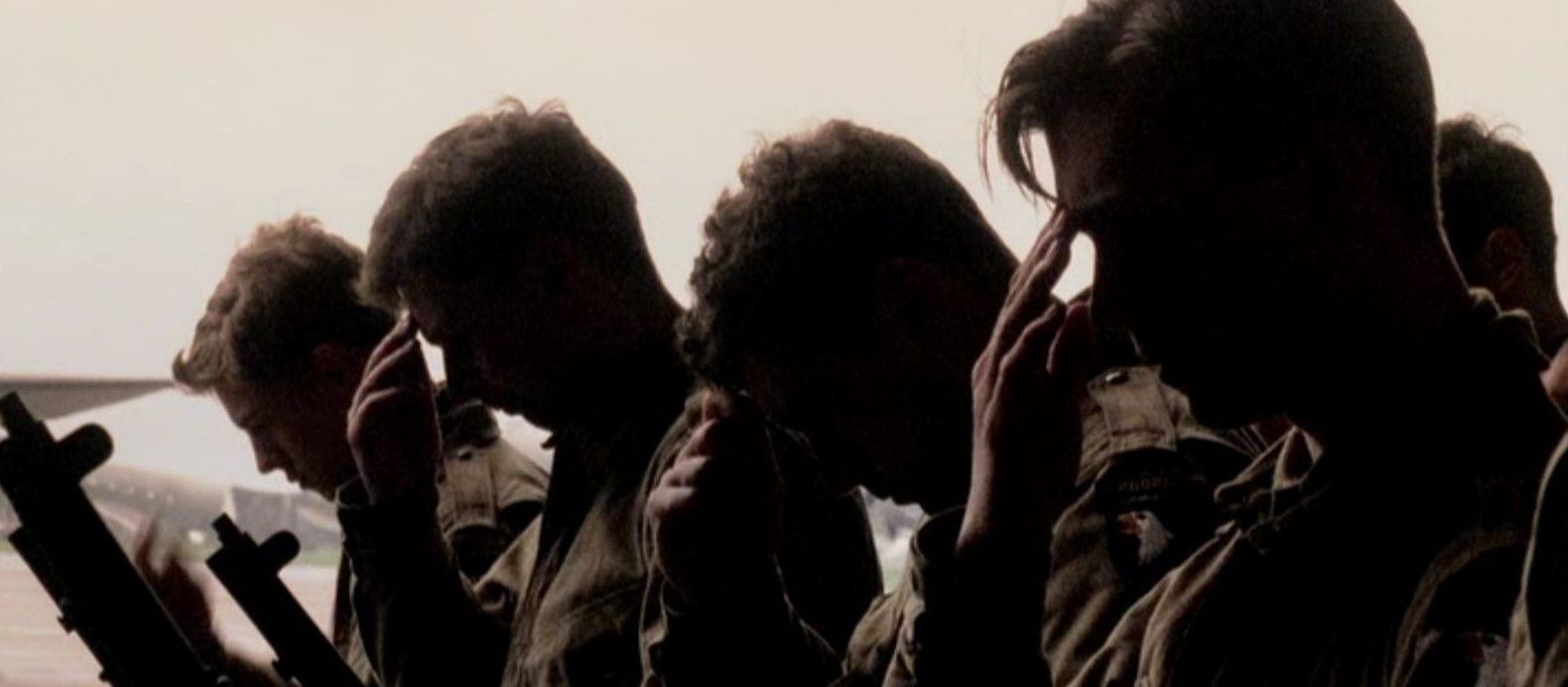
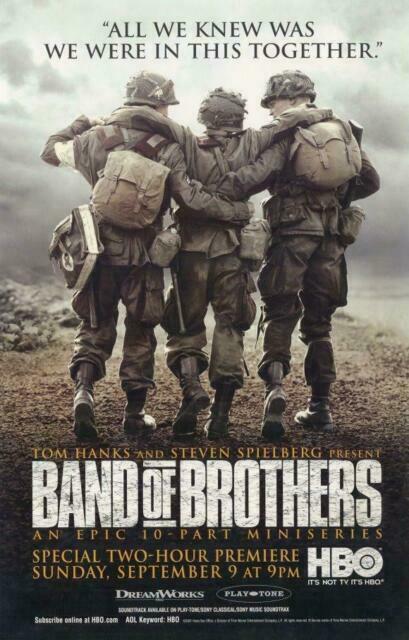
“The only hope you have is to accept the fact that you’re already dead. The sooner you accept that, the sooner you’ll be able to function as a soldier is supposed to function: without mercy, without compassion, without remorse. All war depends upon it.”
There are many different angles from which one could approach the monumental HBO series that dramatizes the exploits of “Easy Company” from their jump training in Georgia to the unconditional surrender of Japanese forces that marked the end of WWII. You could compare it to its primary source text—Stephen Ambrose’s nonfiction account of the parachute infantry’s experience, based on interviews with the company’s surviving members—and check for accuracy and instances of dramatic license. You could consider the series’ creators, Tom Hanks and Steven Spielberg, who had recently achieved commercial and critical success with their WWII film Saving Private Ryan. You could break down the stylistic and technical differences between the series’ episodes, which were helmed by eight different directors. Instead of trying to pen a redundant, bloated retrospective of Band of Brothers, I’d like simply to give some general thoughts, and then discuss a few specific things that stood out to me as I watched through it over the course of a couple weeks.
Band of Brothers is a fantastic tribute to the heroes it portrays. It was made with gravitas and reverence and has rightfully received endless praise throughout the years. It was crafted by confident, invested filmmakers who treat the material and its subjects with clear admiration, but adamantly refuse to romanticize their endeavors. The ensemble cast is uniformly excellent and the characters are well developed, especially considering how little time is given to any single person—which is to say, the overarching narrative, which was fleshed out by Hanks, Erik Jendresen, and a team of writers, is put together with consummate skill. It’s not quite as tight as a feature length film, as it exhibits the differing visions of so many unique directors, but its length allows it to flourish narratively in ways that a film cannot.
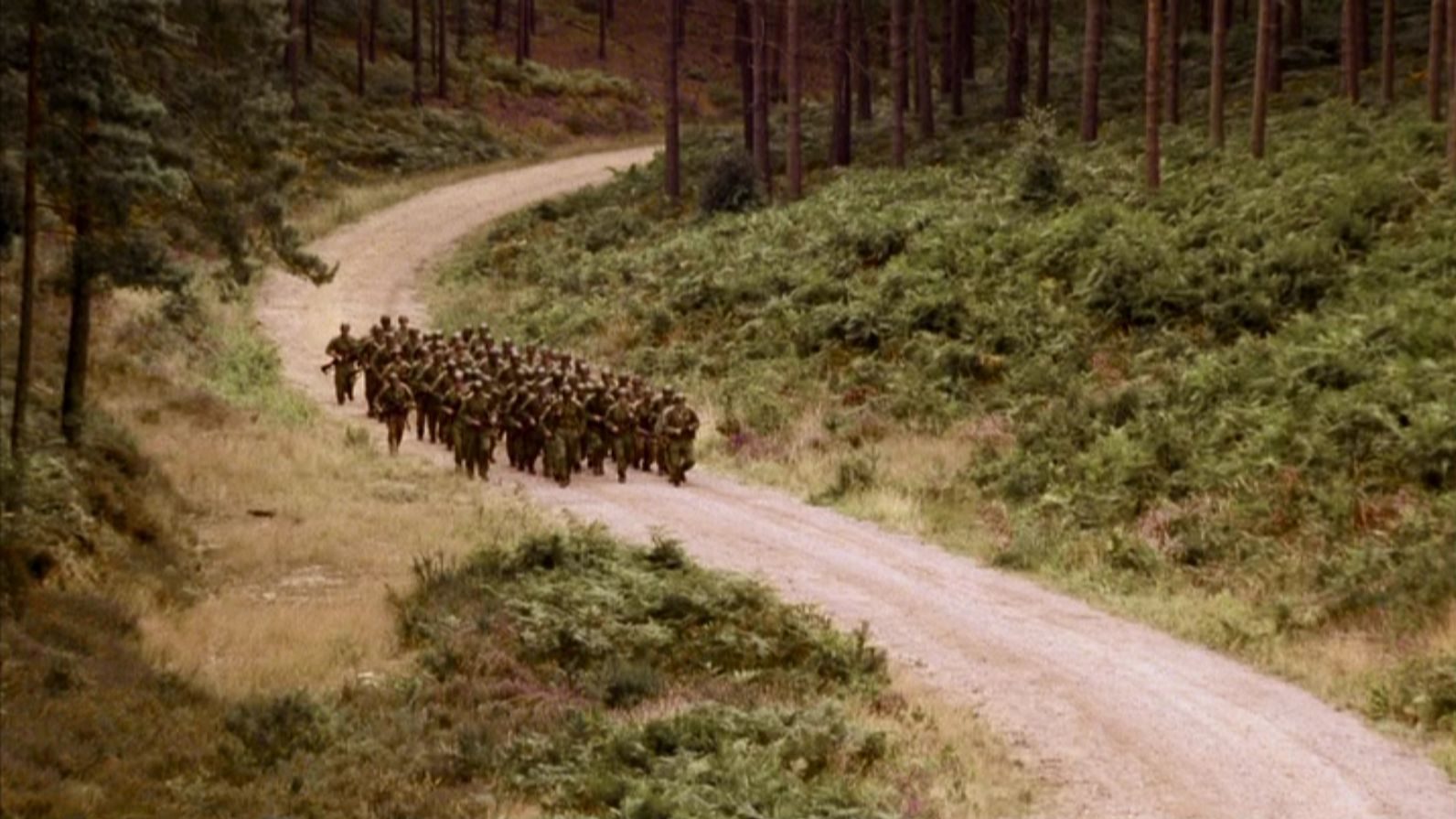
Though the series has a reputation for its brutality, it’s hard to mentally prepare yourself for just how gruesome and graphic the visual depictions of violence actually are. Blood and guts are routine fare after only a few episodes, but that’s stuff that you see all the time in film anyway. But Band of Brothers really pushes the envelope by giving these men some backstory prior to the scenes in which they’re grievously wounded, and in its refusal to turn the camera away in the face of their suffering. This is illustrated most clearly in the one-two punch of episodes six and seven. In “Bastogne” we follow “Doc” Roe (Shane Taylor), a company medic, as he scrounges for basic medical supplies as the troops suffer through snow and cold and the Battle of the Bulge without adequate attire, rations, or firepower. The men huddle in their foxholes as the Germans periodically attack and Doc is frantically tries to care for his dying men.
“The Breaking Point” follows this up with the most distressing episode of the series. By cinematic convention, gruesome deaths are typically reserved for villains, or happen quickly or offscreen if a supporting character must die. Band of Brothers ignores this convention. Partway through this episode, when the men are fortifying their foxholes after returning to the frontline, the Germans begin launching mortars at their location. Caught in a bad position, Joe Toye (Kirk Acevedo) gets hit with shrapnel and most of his right leg is ripped off. A sensible reaction to seeing this occur in front of you would be to go hide in your own foxhole until the bombs stop falling, but Bill Guarnier (Frank John Hughes) risks his own life to pull Joe to safety. But there are still mortars raining down on their location, and Guarnier also loses a leg. And I should mention that you only learn later that both of these men survived—as they lay in the snow bleeding out, Buck Compton (Neal McDonough) seems to grasp the reality of death, and mentally crumbles, unable to find his voice to call for help. He is later shipped home due to his mental instability. Although it is stomach-churching to put yourself through, this episode adeptly illustrates exactly why these men refer to themselves as brothers. The stark reality of war and the taking of life properly emerges, and you begin to understand how such an ordeal would make you love, fight for, and die for the men beside you.
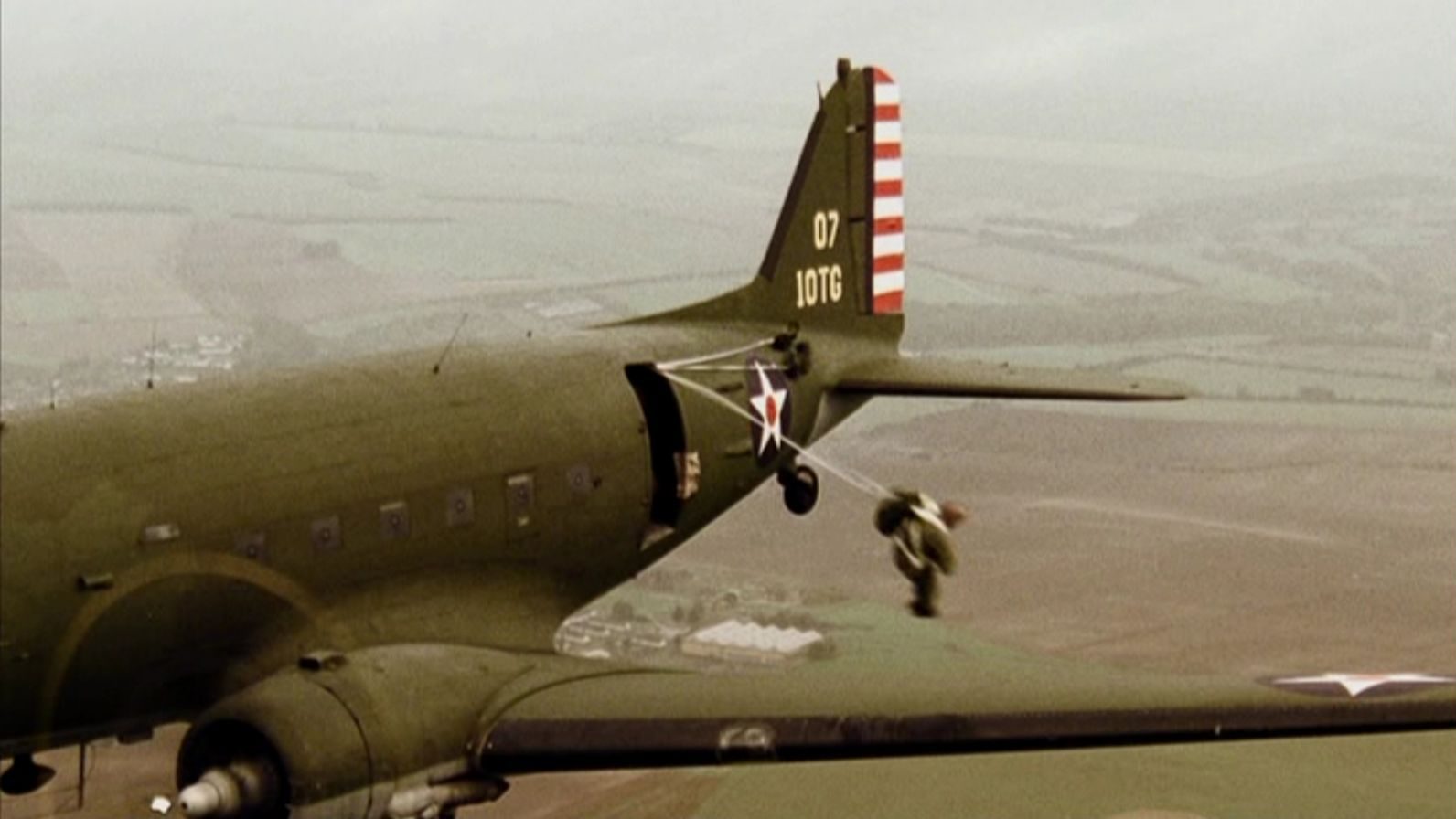
With such a large cast, it would have been easy for the showrunners to find a central character and follow his thread throughout, kind of how they picked a single company rather than try to give an overview of the entire war. One way in which they keep things spread out is by focusing on a single individual for the entirety of each episode. Major Dick Winters (Damien Lewis) is the ostensible “main character” of the entire series, and is the subject of three of the ten episodes. But as Winters climbs the ranks and finds himself removed from the immediate concerns of the footsoldiers, his presence becomes less crucial and less important, as far as we’re concerned. The episodes where boots are on the ground, shots are fired, and blood is flowing are much more memorable. The two episodes already discussed, which focus on Doc and Second Lieutenant Lipton (Donnie Wahlberg), are two that stand out prominently for their effective storytelling and brutal outcomes. While I really liked this narrative method for relaying a complex story with a large cast, I found it didn’t work in every instance. For example, the most affecting episode, the penultimate “Why We Fight”—which shows the discovery and liberation of a concentration camp—is woven together with Captain Nixon’s (Ron Livingston) personal battle with alcoholism, which didn’t fit with the heavy tone or properly serve to lighten it. In any case, by providing voiceover narration and central focus on a single character for an episode at a time, the audience comes to view Easy Company as the main character, rather than any individual character.
Another way that the creators achieved this composite is through the casting of lesser known actors, which allows the real-life characters to feel authentic as they are portrayed by unknown faces. Now, it is true that quite a few of the cast members—particularly Damian Lewis, Ron Livingston, and Neal McDonough—have prominent roles and went on to achieve decent amounts of subsequent success. Watching the series now, these “familiar faces” could potentially detract from the immediate experience because you’ll be constantly reminded of the artifice. I think you understand the phenomenon I’m describing here. This occurs to a lesser extent with the inclusion of Michael Fassbender, Tom Hardy, James McAvoy, and Simon Pegg, who have each achieved massive popularity but are in very small roles here (interestingly enough, a pre-fame Jimmy Fallon also has a bit part). Anyway, to the best of my knowledge, David Schwimmer (who portrayed Ross in the sitcom Friends) was the most famous actor at the time of the show’s premiere, and he only has a large amount of screentime in the very first episode. This intentional casting of under-the-radar actors—most of whom nail their roles and imbue their characters with enough personality to distinguish themselves—allows the audience to view the soldiers as equals rather than giving undue attention to a famous face.
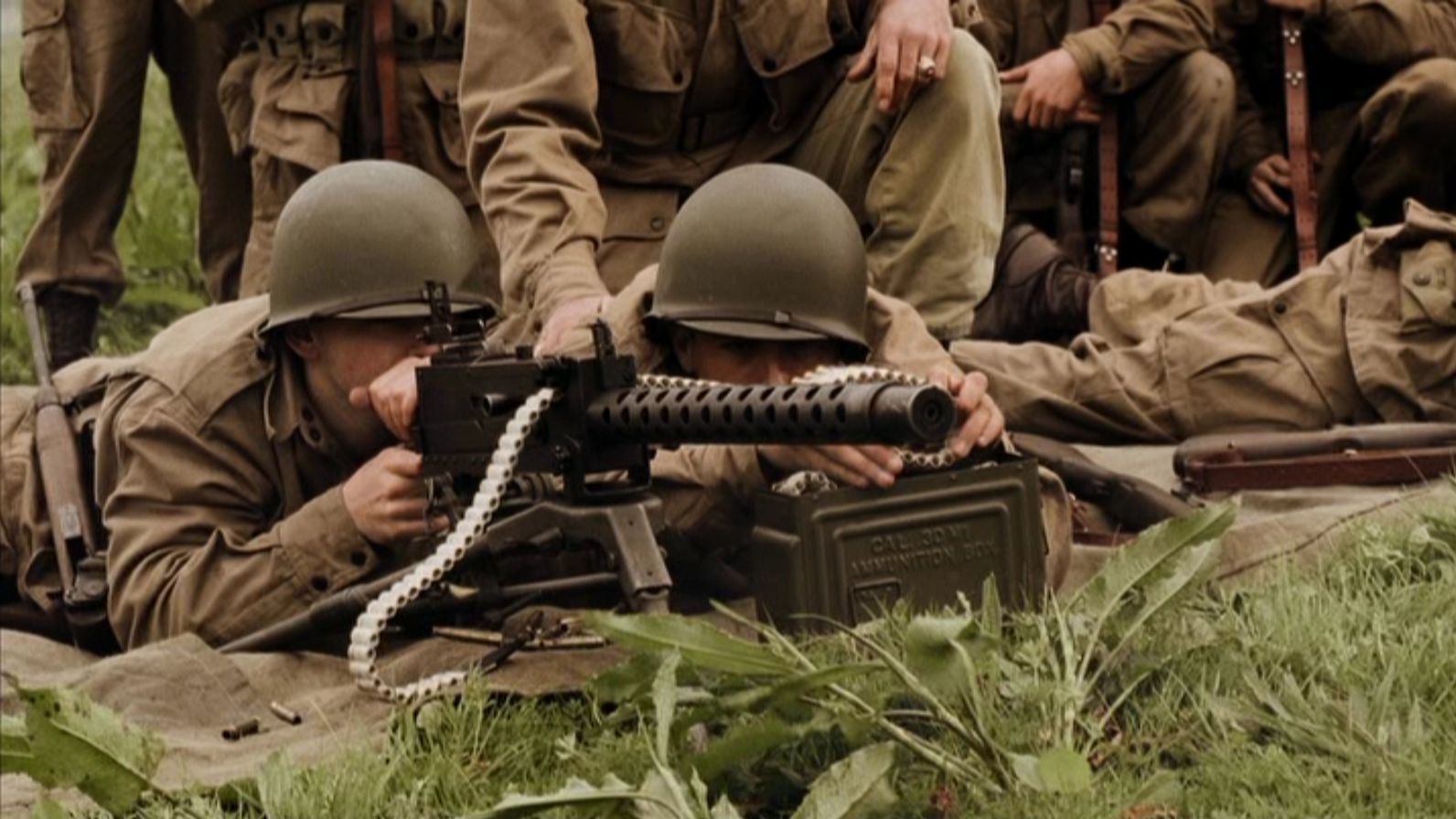
It was not without risk that Hanks and co. decided to open each episode with excerpts from video interviews with surviving members of Easy Company. This could have easily made the following hour of cinema feel like a cheap imitation that capitalized on the sacrifices of these men. But instead, it lent the episodes a sense of weight. In the finale, when the interviewees’ identities are finally revealed to the audience, the connection between these eighty year old men and the exploits you’ve witnessed is only solidified, not cheapened. (There’s perhaps a separate discussion to be had about how cinematic depictions of historical events have the potential to replace our cultural understanding of those moments, but that’s for another time.)
Band of Brothers is a tremendous series. By taking a single thread from the tapestry of WWII and examining it under a magnifying glass, we glimpse the bonds that were formed between these innocent young men who were shipped off to fight in a war they didn’t understand. It does not shy away from the death and emotional hardship that these men experienced, and it’s a worthy tribute to those who author Tom Brokaw christened The Greatest Generation.